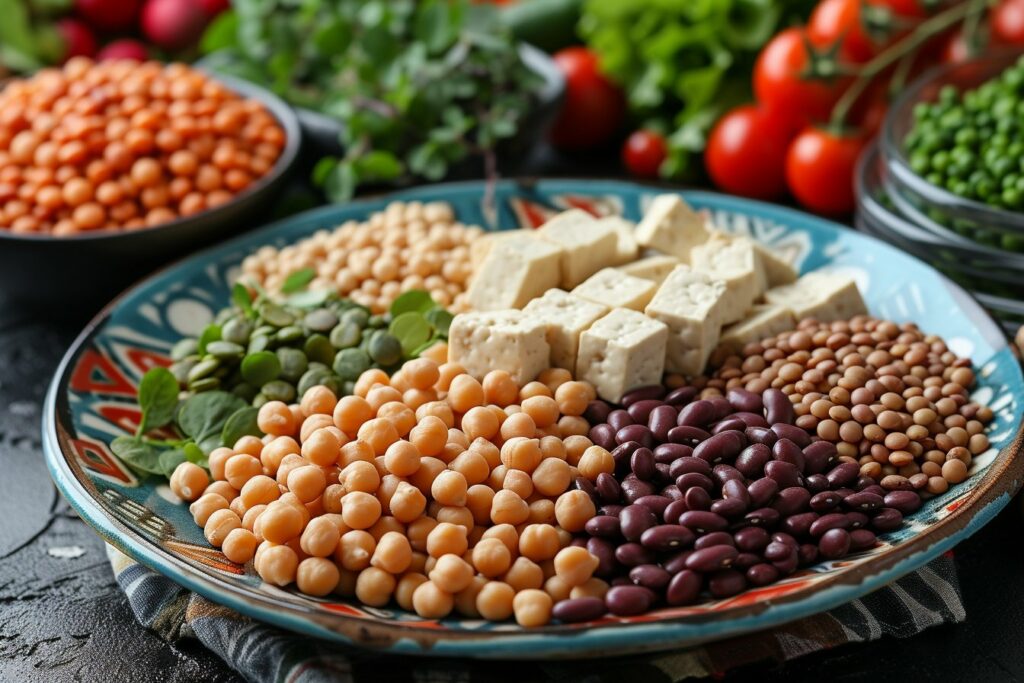As a vegetarian, it’s essential to plan your meals in order to meet the daily recommended protein intake. The body needs sufficient amounts of this vital nutrient for hormone production, muscle building, and repairing tissues. However, with a little thought and consideration, even those adhering to plant-based diets can obtain optimal levels of protein without consuming meat or animal-derived products. In this guide, we’ll explore numerous sources of plant-based protein and discuss ways to ensure you’re getting enough.
The Importance of Protein in a Vegetarian Diet
Vegetarians avoid meat, poultry, and fish consumption, which is why many people concern themselves with their ability to intake adequate amounts of protein. These concerns are valid since protein deficiency may result in decreased energy levels, hair loss, muscle weakness, and a weakened immune system.
However, with some knowledge and meal planning, vegetarians can consume complete and high-quality protein from plant-based foods.
Complete vs. Incomplete Proteins
Not all proteins are created equal; they are categorized as either complete or incomplete based on their amino acid profile. Complete proteins contain all nine essential amino acids that the body cannot produce on its own. While most animal-based proteins are considered complete, many plant-based sources only provide some of these crucial amino acids, making them incomplete proteins.
Fear not, though! Vegetarians can still obtain the necessary amino acids by consuming a variety of plant-based protein sources throughout the day.
Top Plant-Based Protein Sources for Vegetarians
Below are several popular vegetarian protein sources that can be easily incorporated into any diet:
- Legumes and Beans: Rich in protein, fiber, and iron, legumes, and beans such as lentils, chickpeas, black beans, and kidney beans are an excellent addition to a vegetarian diet. They can be easily added to salads, soups, or even made into tasty veggie burger patties.
- Tofu and Tempeh: Made from soybeans, these versatile foods contain complete proteins and are great for absorbing flavors from any dish they’re included in. Try marinating and then grilling tofu or using tempeh as a meat substitute in sandwiches or stir-fries.
- Nuts and Seeds: Not only do nuts and seeds provide healthy fats, but they also supply valuable amounts of protein. Almonds, peanuts, pumpkin seeds, chia seeds, and sunflower seeds are all excellent choices to incorporate into your meals or snacks.
- Whole Grains: Don’t forget to include whole grains when planning your protein intake! Foods such as quinoa, barley, brown rice, and oats contribute important amino acids and can be enjoyed in various dishes like breakfast bowls, salads, and side dishes.
Combining Incomplete Proteins: The Power of Pairing
As mentioned earlier, consuming multiple plant-based protein sources will ensure that vegetarians acquire all the essential amino acids. The process of combining different incomplete protein sources is known as “protein pairing” or “protein complementation.” Some examples of this practice include:
- Beans and rice: popular in numerous cuisines around the world, this simple pairing provides all the required essential amino acids.
- Peanut butter and whole-wheat bread: a classic lunch option beloved by many that also delivers the necessary protein components.
- Hummus and pita bread: Middle Eastern cuisine offers this tasty combination of chickpeas and whole grains for a complete protein experience.
By thoughtfully pairing or complementing incomplete proteins, vegetarians can create diverse meals while still meeting their daily protein requirements.
Vitamin B12 Supplementation for Vegetarians
Maintaining optimal levels of essential nutrients is crucial for overall health. With vitamin B12 primarily found in animal products, it’s vital for those following a plant-based diet to consider fortified foods or supplements. This nutrient plays an important role in nerve function, brain health, and red blood cell production.
Finding appropriate forms of vitamin B12 may include consuming fortified non-dairy milk, nutritional yeast, breakfast cereals, or consulting with a healthcare professional about supplementation options.
A Balanced Approach to Meeting Protein Needs
When adopting a vegetarian lifestyle, ensuring sufficient protein intake can be one of its most challenging aspects. By incorporating a variety of legumes, tofu and tempeh, nuts, seeds, and whole grains into your daily menu and focusing on protein pairing, you can rest assured that your body receives enough nutrition even without meat consumption.
Remember to educate yourself on additional supplementation needs such as vitamin B12, and always consult a healthcare professional if you have specific dietary concerns or are unsure about your nutrient intake. Embracing these steps will undoubtedly set you up for success on your journey to achieving a well-balanced, nutritious, and delicious vegetarian lifestyle.

